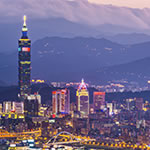When editor-in-chief Christopher Howe and I were invited to attend TIGIS 2013, a green building industry expo colocated with Building Taiwan, this past October, we boarded a plane to Taipei not knowing what to expect. The event officially opened with Peter W. J. Huang, president and CEO of the Taiwan External Trade Development Council, and Kitty Wong, president of the Expo Union Corporation, addressing the media. The depth and breadth of sustainability work going on in the region was immediately apparent. The excitement was tangible as they shared evidence of the green economy’s growth in Taiwan.
As one of the most important green industry exhibitions in Taiwan, the TIGIS expo floor was filled with influential leaders. We met with a number of them, our conversations ranging from wind-energy policy with the Taiwan Small & Medium Wind Turbine Association to smarter energy-management systems with Panasonic Taiwan. We also stopped at the city’s booths where we learned about the Taipei City Government as well as the New Taipei City Government’s involvement in helping the city transition to adopting more sustainable practices. Among its accomplishments are the YouBike system, a bike-share program established by the Department of Transportation, and its campaign, in partnership with the Taiwan Design Center, to vie for the next World Design Capital title in 2016.
The Taiwan International Smart Green City Summit, also held in conjunction with the expo, focused on other important urban issues, specifically the impact created by rapid global urbanization. Seeking smart solutions that rely on sustainability principles, we heard from key voices in the discussion: Tracye McDaniel, president of Choose New Jersey; Andrew Leung, president of Hong Kong-based Asian Institute of Intelligent Buildings; Stanley Yip, director of planning and development at ARUP; and Damian Tang, president of Singapore’s Institute of Landscape Architects.
Further emphasizing that the week was the culmination of the region’s green industry, the 2014 Eco-Products International Fair held a pre-show press conference, months before its event, presenting information on growing green markets, and identifying opportunities to expand green trade and cooperation in Taiwan.
Outside of the conference, we sat down with 3M Taiwan to take a deeper look at its sustainability initiatives. Paul Kim, its managing director, and Jack Xiong, the country’s technical leader, provided us with some insight into many of the corporation’s core initiatives including the new, state-of-the-art 3M Research and Development Center, which was designed as a showcase for sustainable solutions. This effort, along with its Water Citizen Campaign, which helps encourage water conservation in Taiwan, shows that 3M and other companies in the region are moving the small country’s green economy forward.
Overall, the trip gave us a wealth of insight into the environmental innovations, technologies, companies, and global partnerships in Taiwan. Because of shows like TIGIS and Building Taiwan, Taiwan’s green economy will only continue to improve and gain further international recognition.
Check out green hotels in Taiwan, Hong Kong, and beyond in the Green Typologies section.
Mandarin Oriental Macau:
Laura Heidenreich is a LEED Green Associate and serves as the associate publisher of gb&d. Reach her at [email protected]/magazine.



